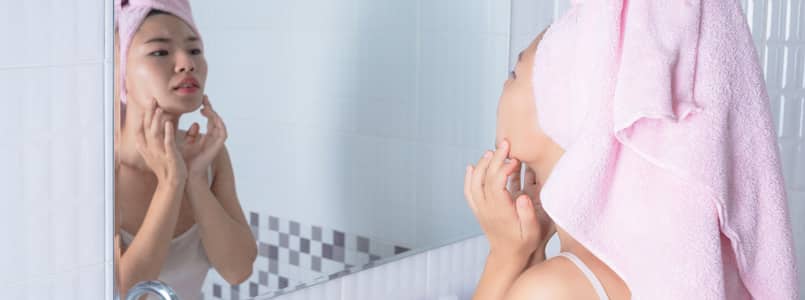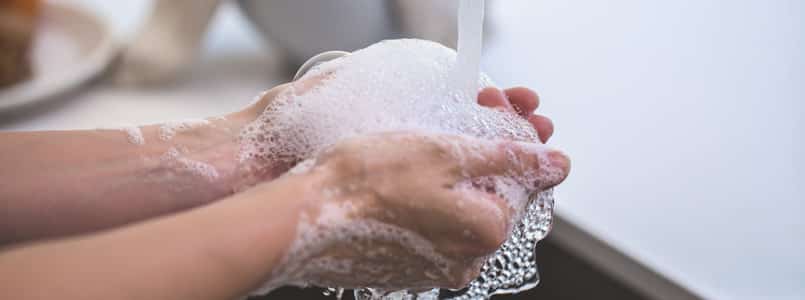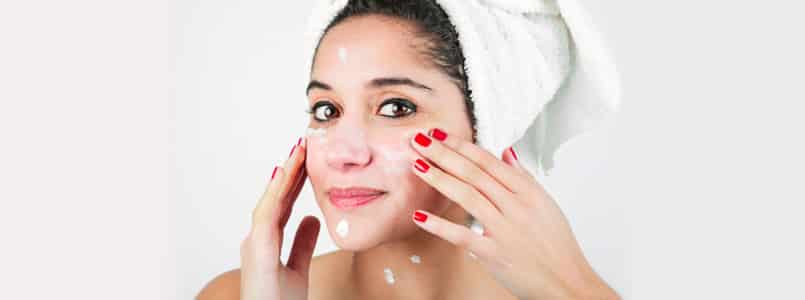Phentermine and Acne
Phentermine weight loss pills come with a long list of potential side effects, but acne is not listed as one of them. Still, people taking this medication often comment that they are breaking out like teenagers.
So, can phentermine cause acne? This medication increases breakouts in some people, but the unwelcome phentermine acne may be a result of hormonal changes, weight loss, and lifestyle changes more than the pills themselves.
Does Phentermine Cause Acne?

Most medical professionals maintain that phentermine does not cause acne, but phentermine users continue to report breakouts.
In fact, about 4% of phentermine users in a recent poll reported battling phentermine acne at some point during their weight loss journey (
This statistic is corroborated by dozens of phentermine support group members who report new or worsening acne while taking this medication. In their discussions, the most commonly described presentation is large, red pimples on the jawline and chin. Some users also report phentermine acne on other parts of their face or body.
Causes of Phentermine Acne
Despite the relatively common occurrence of this reaction, there is very little scientific information about phentermine acne or why this medication causes breakouts. Even with acne in general, the medical community has a lot of theories about what causes it, but no one is exactly sure.
Keeping that in mind, here are some possible reasons for phentermine acne breakouts:
Adult Acne
It could be that your phentermine acne is just an unwanted presentation of adult acne. An estimated 51% of women in their 20s and 35% of women in their thirties suffer from adult acne (
Acne is often typecast as a teenage problem, but pimples and breakouts are surprisingly common in adults of all ages. Some adults had acne as teenagers and deal with it as a chronic condition, while others had beautifully clear skin in adolescence and suddenly start breaking-out later. Unlike teens who usually battle with lots of small little bumps and pimples in the T-zone (forehead, nose, chin), adults are more likely to have larger red bumps and pustules along the jawline and chin (
So, a breakout that initially seems like phentermine acne may just be an unwelcome appearance of adult acne.

Stress Response
Phentermine stimulates the central nervous system to promote weight loss. This tricks your body into thinking you are in a constant state of stress, which leads to some desirable effects (like appetite suppression and increased energy), but also some less-desirable results.
Just like stress from everyday life can wreak havoc on your skin, so too can stress simulated by phentermine. Emotional stress increases oil production by the pores, and, in individuals prone to acne, this oily substance can clog pores and lead to breakouts.
Stress also slows healing, so existing pimples take longer to clear up during when stressed (
For both of these reasons, phentermine acne breakouts can seem more severe and enduring if your body thinks it is stressed because of the medication, or if losing weight loss proves a constant source of stress.
Hormonal Changes
Hormonal changes could also be the culprit behind phentermine acne.
Similar to adult acne in general, hormonal acne is more common in women (
Estrogen, for example, is stored in body fat. So, when someone loses a lot of weight, estrogen levels decrease.
Also, as part of the intentional CNS stimulation brought about by phentermine, cortisol levels increase.
Given that hormonal changes are correlated with general acne flare-ups, including breakouts that happen around your time of the month, hormonal variation may be part of the reason that phentermine causes acne.
Lifestyle Changes
Lifestyle changes may also play a role in phentermine acne. While daily habits are not the underlying cause of breakouts, lack of sleep, poor diet, or poor post-gym hygiene habits can contribute to acne flare-ups.
- Sleep
Quality sleep can be hard to come by while taking phentermine, especially if you are struggling with insomnia. However, sleep is critical to balance hormone levels (4 ). So, if you are struggling with phentermine acne breakouts, spend some extra time prioritizing rest and relaxation. Try to sleep 7-9 hours each night and develop effective stress-management techniques. - Diet
Have you heard that that chocolate, sugar or milk cause acne? Some research indicates that consumption of a high-glycemic or milk-heavy diet may worsen acne, but data remains inconclusive (5 ). There is little evidence to support any direct correlation between eating chocolate or greasy food and acne severity. As a result, the link between diet and acne is highly-debated in the dermatological community. Most professionals still recommend a healthy, balanced diet and proper hydration for skin and overall health. - Exercise
Many people start exercising a lot more when they begin phentermine. It is healthy and fun to work up a sweat, but letting sweat and grime dry on your skin can make phentermine acne worse. So, make sure to shower as soon as you finish. Also avoid touching your face while using shared equipment (like weights or elliptical trainers) at the gym. These items are covered with germs and dirt, so both your skin and immune system will thank you for keeping your dirty hands away from your face!
How to Prevent Acne While Taking Phentermine

Regardless of what is causing the pimples, most people with sudden and bothersome breakouts want to know how to prevent acne while taking phentermine. Here are a few easy ways to reduce your risk of phentermine acne:
Commit to a Skincare Routine
Many of us slack on our skincare routines after the teenage breakouts clear up, but a consistent, daily skincare routine is your first line of defense against acne.
Dermatologists recommend washing your face with a gentle cleanser twice per day, plus any time you sweat. Look for hypoallergenic face washes to minimize irritation, and steer clear of scrubs since they can actually bother your skin more.
If your skin is dry, add a daily non-comedogenic (non-clogging) moisturizer (
Avoid Irritants
Consider the role of your environment as well. Throughout the day, be vigilant about minimizing contact with substances and surfaces that could worsen phentermine acne breakouts.
Decrease environmental irritants by making an effort to:
- Wash your face (or other problem areas) immediately after sweating
- Change your pillowcase at least twice per week
- Wipe down your phone frequently, especially if you hold it right against your face
- Shampoo your hair regularly, particularly if it’s naturally oily
- Not touch your face throughout the day
- Favor non-comedogenic (non-pore clogging) beauty products
How to Treat Phentermine Acne

If phentermine acne has already made its unwelcome appearance, you have a couple options to treat breakouts at home. You should continue to practice a consistent, daily skincare routine, but you can also experiment with natural or over-the-counter (OTC) acne treatments. If these solutions are not clearing your acne or your breakouts are severe, talk to a dermatologist for professional help.
Try Home Remedies
While more severe phentermine acne usually requires medical treatment, mild to moderate acne may be manageable with natural, at-home treatments.
Tea tree oil, for example, proves an effective treatment for mild to moderate acne (
Green tea extract, and specifically its main antioxidant epigallocatechin-3-gallate (EGCG), has also been shown to reduce inflammation and sebum production in acne sufferers (
OTC creams, face washes and spot treatments can also help manage mild phentermine acne. Look for a product that contains benzoyl peroxide to help clear your breakout faster (
Make a Doctor’s Appointment
Dermatologists have a wide array of prescription treatment options for acne, depending on the underlying cause of your breakouts. They may prescribe topical treatments, medication, or a combination of the two to manage your condition.
Though you will not see a resolution overnight, phentermine acne outbreaks are manageable and treatable.
Back to All Phentermine Side Effects
- Members of “Losing Weight with Phentermine” Support Group on Facebook & Phentermine.com Forum. (2019, March 13). [User Report of Common Phentermine Side Effects]. Unpublished raw data.
- Collier, C. N., Harper, J. C., Cafardi, J. A., Cantrell, W. C., Wang, W., Foster, K. W., & Elewski, B. E. (2008). The prevalence of acne in adults 20 years and older. Journal of the American Academy of Dermatology, 58(1), 56-59. doi:10.1016/j.jaad.2007.06.045
- Zari, S., & Alrahmani, D. (2007). The association between stress and acne among female medical students in Jeddah, Saudi Arabia. Clinical, Cosmetic and Investigational Dermatology, 10, 503-506. doi:10.2147/ccid.s148499
- American Academy of Dermatology. (2007, November 12). Feeling Stressed? How Your Skin, Hair And Nails Can Show It.
- National Health Service. Acne Overview (2016). Acne.
- Pappas, A. (2009). The relationship of diet and acne. Dermato Endocrinology, 1(5), 262-267.
- American Academy of Dermatology. (2018). Face washing 101.
- Jooya, A., Siadat, A., Iraji, F., & Enshaieh, S. (2007). The efficacy of 5% topical tea tree oil gel in mild to moderate acne vulgaris: A randomized, double-blind placebo-controlled study. Indian Journal of Dermatology, Venereology and Leprology, 73(1), 22. doi:10.4103/0378-6323.30646
- Mahmood, T., Akhtar, N., Khan, B. A., Khan, H. M., & Saeed, T. (2010). Outcomes of 3% Green Tea Emulsion on Skin Sebum Production in Male Volunteers. Bosnian Journal of Basic Medical Sciences, 10(3), 260. doi:10.17305/bjbms.2010.2697
- Yoon, J. Y., Kwon, H. H., Min, S. U., Thiboutot, D. M., & Suh, D. H. (2013). Epigallocatechin-3-Gallate Improves Acne in Humans by Modulating Intracellular Molecular Targets and Inhibiting P. acnes. Journal of Investigative Dermatology, 133(2), 429-440. doi:10.1038/jid.2012.292

